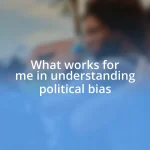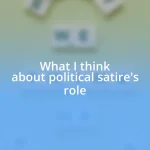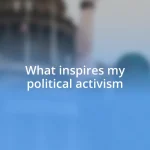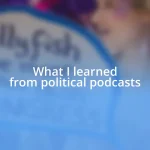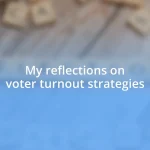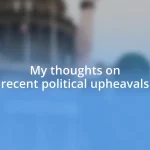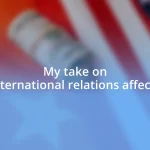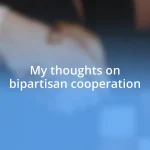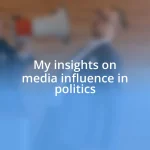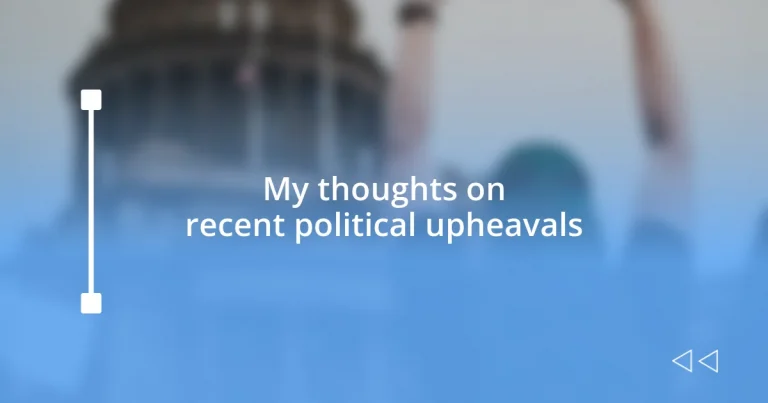Key takeaways:
- Political upheavals arise from societal dissatisfaction, often driven by economic disparities and a desire for change.
- Social media and cultural shifts play crucial roles in amplifying voices, shaping movements, and challenging traditional values.
- Future governance may evolve toward greater transparency and public engagement, utilizing technology to enhance civic participation and accountability.
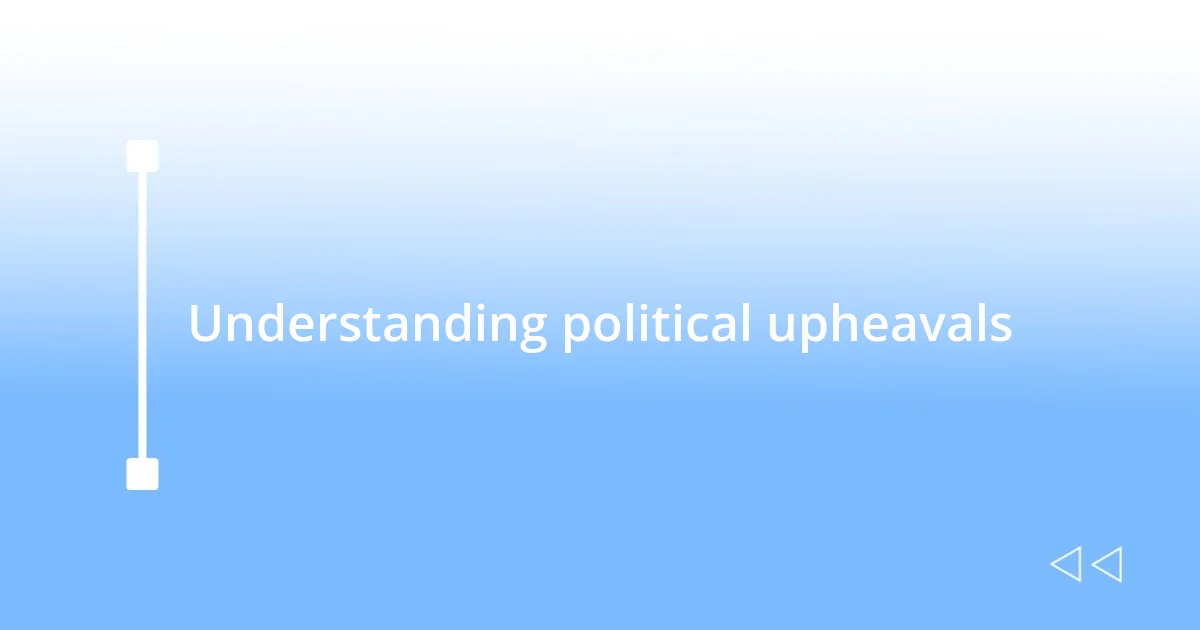
Understanding political upheavals
Political upheavals often stem from a deep-seated dissatisfaction within a society. I remember watching the news during a particularly tense election season, feeling a mix of anxiety and hope for my community. It made me realize that these events are more than just headlines; they are cries for change, reflecting the frustrations of ordinary people whose voices often go unheard.
At times, I wonder why it takes such drastic measures for voices to be recognized. The fear of instability often keeps many from speaking out, and yet, history shows us that it is in these moments of chaos that new ideas can emerge. The emotional weight behind a protest is tangible; it’s a mix of fear, hope, and a burning desire for change.
These upheavals can lead to uncertain futures, and as someone who has felt that uncertainty, I understand how it can ripple through communities. It’s fascinating, isn’t it? The struggle for change can ignite a fire, fostering a collective sense of purpose even amidst turmoil. For me, witnessing this interplay between chaos and camaraderie underscores the complexity of human emotion in political struggles.
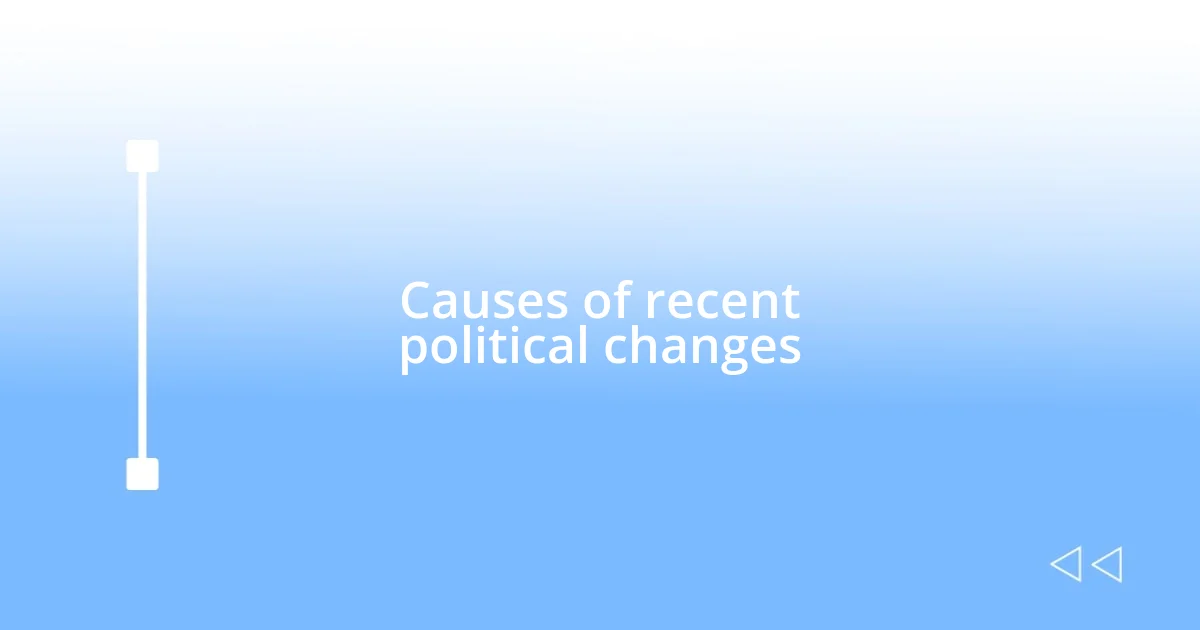
Causes of recent political changes
The recent political changes can often be traced back to economic disparities within society. I vividly recall a conversation with a friend who had just lost her job due to corporate downsizing. Her frustration mirrored that of many others facing similar injustices, highlighting a growing sense of inequality that fuels unrest. When people feel left behind by their government due to economic factors, they’re more likely to take to the streets demanding change.
Moreover, social media has played a pivotal role in shaping these political landscapes. I remember scrolling through my feeds during major protests, where individuals shared their stories and rallied support. It struck me how these platforms have become modern-day town squares, amplifying voices of dissent and connecting like-minded individuals across vast distances. This virtual solidarity often translates into real-world action, propelling movements that reflect the urgent desire for change.
The influence of cultural shifts cannot be overlooked either. As society evolves, so do its values and beliefs. I encountered this firsthand at a community event where diverse perspectives clashed, yet ultimately led to a richer understanding of our collective needs. This process of cultural exchange often ignites discussions about justice, equality, and representation, propelling change as traditional structures are challenged and redefined.
| Cause | Impact |
|---|---|
| Economic Disparities | Increased unrest and demand for change |
| Social Media Influence | Amplification of voices and mobilization of movements |
| Cultural Shifts | Challenges to traditional structures and evolving values |
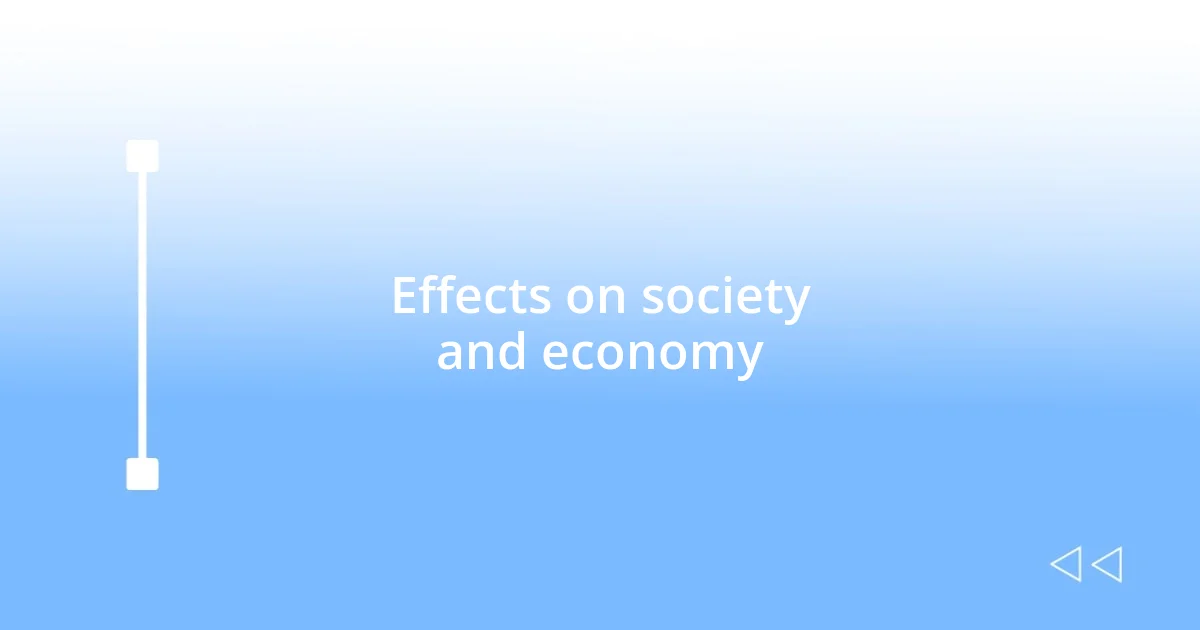
Effects on society and economy
The effects of political upheavals on society and the economy can be profound and far-reaching. I’ve seen firsthand how communities can feel fragmented in the midst of chaos. For instance, during a recent wave of protests, I spoke with a local business owner who was concerned about declining sales as customers shifted their focus to social issues rather than their daily routine. His anxiety was palpable, reflecting a larger trend where political instability can lead to economic downturns, creating a cycle of uncertainty.
- Increased Job Losses: Businesses may struggle to operate amid political turmoil, leading to layoffs and economic instability.
- Shift in Consumer Behavior: People often prioritize social issues over spending, impacting businesses reliant on steady sales.
- Erosion of Trust: Political upheavals can foster distrust in institutions, making people reluctant to invest or spend money.
- Opportunity for Social Enterprises: Conversely, these times can spur innovation, as there tends to be a rise in social enterprises that address community issues and reflect new values.
While some may see upheavals solely as chaos, it’s essential to recognize that they can also lead to significant societal shifts. I remember feeling a sense of solidarity when attending a town hall meeting shortly after a major protest. Community members passionately discussed how to address the needs highlighted during the unrest, from affordable housing to better access to healthcare. Such conversations show that, amidst the turmoil, there is a potential for collaboration and collective action, leading to deeper social cohesion and awareness of shared struggles.
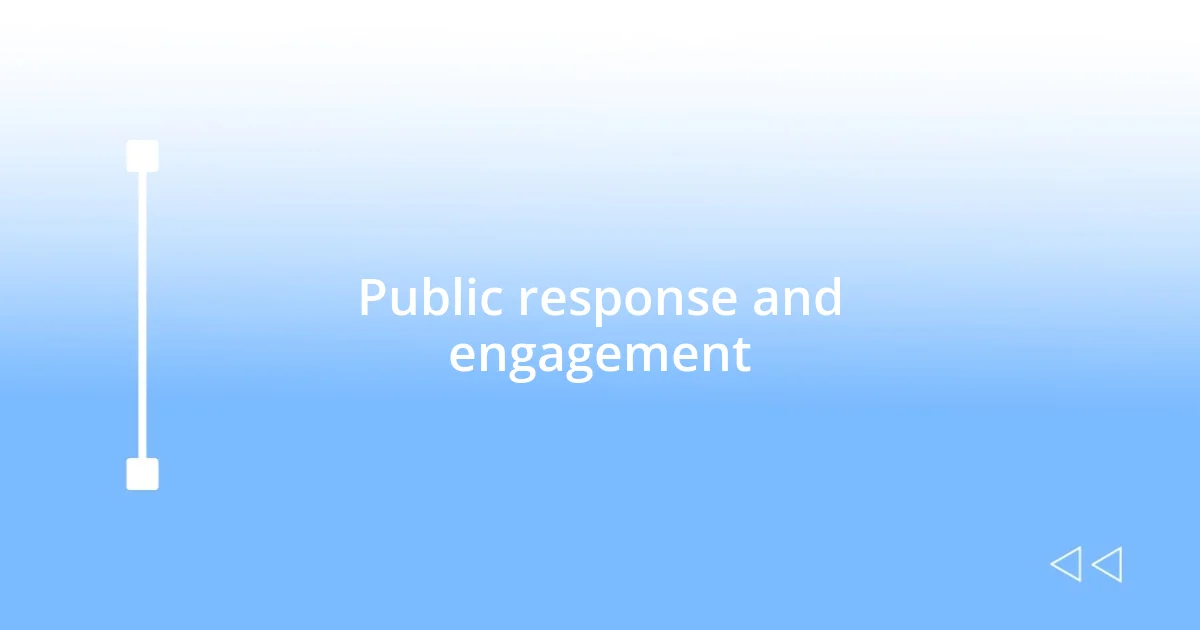
Public response and engagement
It’s fascinating to see how public response has evolved in an age dominated by digital interaction. I remember watching a live stream of protests where people expressed their frustrations and demands in real-time. The energy was infectious, even through a screen. It made me ponder – how often do we underestimate the power of a collective voice? Engaging in these digital conversations creates an immediate sense of community, which can inspire those who may not have felt compelled to act outside their homes.
Community gatherings and grassroots movements are also pivotal in fostering engagement. Last week, I attended a neighborhood assembly organized in response to recent political shifts. People from different walks of life came together, sharing their experiences and hopes for the future. It struck me how these forums allow for genuine dialogue and connection. Isn’t it interesting how, amidst political strife, the need for human connection transcends our differences, highlighting our shared desire for a better future?
Moreover, the role of art and expression in public response cannot be overlooked. I vividly recall seeing a mural painted in our city square that depicted the struggles and hopes of our community. It served as a catalyst for conversations about change, drawing people together to discuss actionable solutions. Art has this incredible ability to encapsulate emotions and rally support. Doesn’t it inspire you to consider how creativity can be a powerful form of engagement? The fusion of activism and artistic expression is a remarkable testament to the resilience and ingenuity of the public in times of upheaval.

Media’s role in shaping opinions
The media plays a pivotal role in shaping public opinion, especially during times of political upheaval. I’ve often found myself reflecting on how a single news segment can ignite passionate discussions among friends and family. For instance, after a particularly polarizing report about a recent protest, I noticed my friend change her viewpoint entirely. It was intriguing to see how her perception was influenced by the way the media presented the story, highlighting just how powerful narrative framing can be.
In my experience, the type of coverage matters significantly. If the media chooses to prioritize sensational headlines over nuanced reporting, it can create a distorted view of the situation. I remember feeling frustrated when a local outlet focused on the chaos of a protest while glossing over the community’s genuine concerns. This isn’t just about reporting facts; it’s about whether those facts resonate with the public’s broader feelings and understanding. Doesn’t it make you wonder how the tidbits we consume each day shape our beliefs and actions?
Furthermore, social media has shifted the landscape dramatically. During the recent political events, I frequently turned to platforms like Twitter for updates, quickly realizing that these snippets of information could either unify or polarize opinions. It felt surreal to scroll through a mix of outrage, support, and even misinformation, all vying for attention. Have you ever felt overwhelmed by the sheer volume of conflicting narratives online? I certainly have, and it highlights the urgent need for media literacy. Understanding how to decipher and critically evaluate what we see can empower us—and maybe, just maybe, lead to a more informed public discourse.
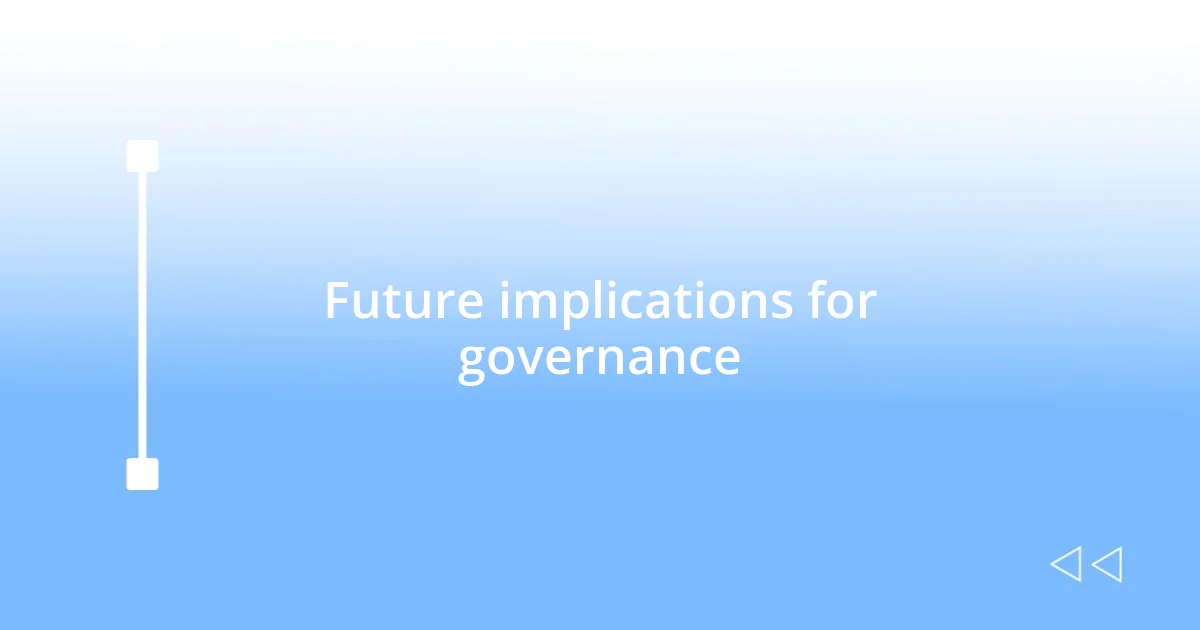
Future implications for governance
The recent political upheavals have left me contemplating the future landscape of governance itself. I can’t help but think about how increased public engagement could lead to more participatory forms of governance. Imagine local councils with regular feedback sessions, where citizens’ voices shape policy decisions. Isn’t it exciting to consider that we might be heading toward a model of governance where accountability isn’t just an obligation but a shared responsibility?
I’ve also noticed that political upheavals often encourage a shift towards transparency. People are demanding clear answers about decisions that affect their lives. I remember attending a town hall meeting recently where residents asked pointed questions about funding allocations. The officials’ explanations, or lack thereof, became a focal point of the discussion, revealing a community craving openness. Could it be that these demands will lead to more stringent regulations on how decisions are made and communicated? The prospect of collective oversight could redefine the relationship between the governed and those who govern, making it far more collaborative.
As we move forward, I believe that embracing technology will play a crucial role in governance. The tools we use today enable quick communication and foster collaboration in ways I never imagined possible. I often catch myself thinking about apps and platforms that can streamline civic engagement, making it easier for people to contribute to discussions or access essential services. What if technology could serve as a bridge, connecting communities more effectively? The limitless possibilities spark an excitement within me as I envision a modern governance model that reflects the voices of its constituents while remaining adaptive to their ever-changing needs.
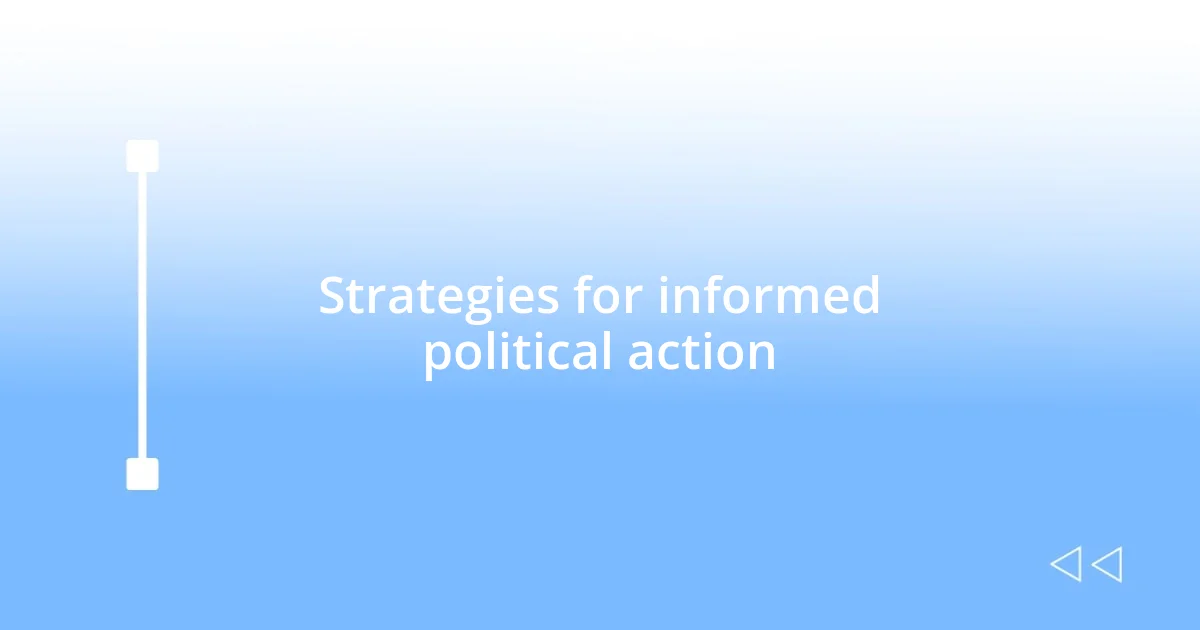
Strategies for informed political action
One of the most effective strategies for informed political action is engaging in continuous education about the issues that matter. I remember a few years ago, I committed to reading a variety of perspectives on a hot-button issue affecting my community. By consuming articles, attending lectures, and talking to people directly impacted, I saw how layers of complexity often get obscured by simple narratives. Have you ever felt like you only get half the story? It’s revealing to discover that knowledge isn’t just power; it’s a foundation for meaningful action.
Additionally, connecting with grassroots organizations can amplify personal efforts. A couple of months back, I joined a local advocacy group focused on environmental justice. The experience was eye-opening, as I watched firsthand how coalition-building translates personal outrage into collective action. It dawned on me how invaluable it is to collaborate with others who share a vision. Have you considered how your personal efforts could be multiplied within a community framework? This sense of collective purpose can often inspire deeper commitment and more strategic initiatives.
Finally, I cannot stress enough the importance of thoughtful communication with others about political topics. I’ve often found that discussing different viewpoints in a respectful manner not only broadens my understanding but also invites others to rethink their positions. For instance, sharing my insights during casual conversations—rather than being confrontational—has led to richer dialogues and, surprisingly, even some changed minds. Have you seen how vulnerability in sharing can foster connection? It’s in these moments that we build bridges, transforming the often divisive political landscape into opportunities for shared growth and understanding.
